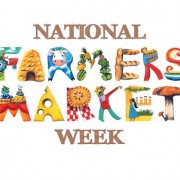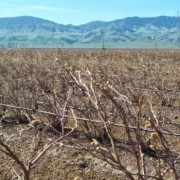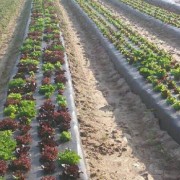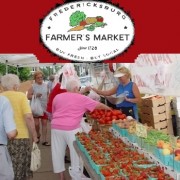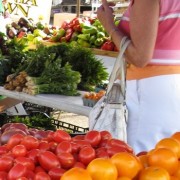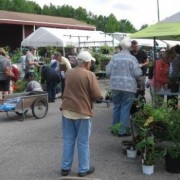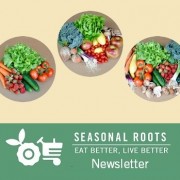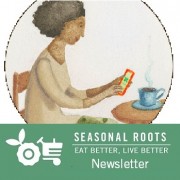The truth about farmers markets customer service — plus recipes!
– Last in a 4-part series on Virginia farmers markets
– By Kristin Henderson, chief veggie conversationalist:
(Part 1: Virginia Beach farmers markets)
(Part 2: Northern Virginia farmers markets)
(Part 3: Fredericksburg farmers markets)
As I was researching this series, I came across this from a shopper at a farmers market: “Enjoyed seeing the variety of pickles and beef truck. The soap vendor spent her time at the pickle vendor’s tent telling us what she thought we should purchase from him….not good. Would have enjoyed spending time ourselves talking with the pickle vendor.”
Yikes. Because there are so many different vendors at a farmers market, the customer service naturally varies from vendor to vendor, and sometimes it’s real hit or miss — like the poor pickle vendor, caught in a pickle that wasn’t even of his own making. (Sorry, I couldn’t resisit.)
How do you measure customer service at a farmers market? For me, it’s a combination of things: Friendliness, respect, knowledgeability, and responsiveness. I don’t want to be ignored, but I don’t want them to bug me, either. And what do you do if you get home and discover there’s a problem with something you bought? How do you get help after the sale?
Richmond farmers markets
The Richmond area is jam-packed with farmers markets. Here are some insights into the customer services on offer at a diverse selection from around the city, from big well-known markets to smaller neighborhood ones.
One thing these markets have in common is they’re all friendly (what farmers market isn’t?!), most are dog-friendly, too, and they’re all open at least one day a week this time of year. A few are open year-round.
South of the James Farmers Market is the big kahuna among Richmond farmers markets, with about 100 vendors in the summers. Folks who shop here say it’s exciting and entertaining. In between its Saturday market days you can reach the market managers by email and USPS snail mail.
Farmers Market @ St Stephen’s is small and stress-free with easy parking. They’re open on Saturdays. In between market days they offer an email contact on their website.
Birdhouse Farmers Market, formerly known as the Byrd House Market, is tucked away off the beaten path. It’s open on Tuesdays and considered a real find by loyal shoppers in its neighborhood. One unique customer service that they offer is a pop-up library. On their website they also offer a phone number! Another unique service. So you can reach the market managers by phone or email when the market’s not open.
Carytown Farmers Market is also a little neighborhood market. Customers like that it’s open on Sundays and surrounded by fun Carytown shopping. To get in touch with the market reps when the market’s closed, there’s an email address, a mailing address, and a contact form on the website.
Lakeside Farmers Market, open on Saturdays and Wednesdays, is praised for its wide food selection by the folks who shop there — which is at least partly a result of the market not requiring its vendors to stick to local food only. On its website, the market is open about the fact that they’re not producer-only, meaning that some of their vendors sell things they haven’t grown or made themselves, including foods grown way outside our region. Also of note: Of all the Richmond markets listed here, this one is the only one that prominently offers a one-week satisfaction guarantee — anything you’re not happy with you can return to the vendor who sold it to you the following week for a replacement, refund, or credit. There’s also an email address and online contact form to get in touch with the market managers between market days.
West End Farmers Market is open Saturdays and its managers can be reached by email when it’s not open. Shoppers who live in the West End love that this market is so conveniently close to home.
What happens to customer service when the market’s not open?
Most markets are super helpful and friendly during the few hours they’re open for business. But what happens if you get home, unload your bags of booty, and discover there’s a problem? Who do you contact?
That’s totally up to the market and the individual vendor. All the Richmond farmers markets listed here offer at least an email option for getting in touch with the managers. Many vendors make their contact info available, too, at their booths and online. But assuming they’re willing to give you a replacement or refund, you still have to go to considerable effort. To return anything, you have to return to the market along with the item you want to take back. If you don’t have the time or transportation to get back before their deadline, whatever that may be, you’re out of luck.
This is where an online farmers market like Seasonal Roots has an advantage. While Seasonal Roots is modeled on the farmers markets we love, the lack of customer service between market days was one thing we decided not to copy.
To start with, our farmers market online shopping is open all weekend, from 2:00 Friday afternoon till 11:59pm Sunday. So the available “open” hours when you can get your local food shopping fix are a lot more convenient.
We also provide farmers market home delivery at no extra cost. So you don’t have to go anywhere and that saves you time. Plus everything we deliver is guaranteed. If there’s ever an issue with anything, we’ll give you a replacement or refund, no problem.
To report an issue, we built in an easy way to do it on our website. (Near the end of this article is a description of how to report an issue.) It takes about a minute. After that, if a replacement’s in order, we’ll home deliver it to you along with your next order. If a credit is due, we’ll issue it pronto. Easy peasy. You never have to track down individual vendors or mess with trying to get in touch with market managers who often have other day jobs.
For any other questions or concerns, you can contact our dedicated support team of veggie fairies by email or phone (757-351-4565).
And one more thing… recipes!
Of course, most of the stuff you bring home from a farmers market or receive at your doorstep from Seasonal Roots is totally fine and ready to eat — and the sooner you eat it, the better. Fresh local produce is loaded with more nutrients and flavor than grocery store produce because it’s just days from the field, whereas grocery store produce is at least a week old, often older. The longer it sits, the more nutrients and flavor it loses. So it’s best to get busy eating!
To make it easy for you to do that, we include several recipes with every delivery and post them on Pinterest, too. We think that’s just good customer service. Check it out!
In the end, any Virginia farmers market that features local food is good for local farmers and food artisans. That’s our bottom line goal here at Seasonal Roots. As long as family farmers can make a living, we’ll all continue to have access to delicious, nutritious local food that’s good for us and good for the planet. So when you have the time, go spend a few hours at your local farmers market. For your day-to-day local food needs, there’s Seasonal Roots.
Either way, in-person or online, we’ll see you at the farmer’s market!
ABOUT SEASONAL ROOTS
Since 2011, Seasonal Roots’ online farmers market has connected Virginia families with local family farmers who use sustainable, humane practices. Our veggie fairies – mostly moms who believe in living better through scrumptious, healthy eating, being kind to animals, protecting the environment, and spreading joy – home-deliver freshly harvested produce, pastured eggs, grassfed dairy and meat, plus artisan fare. We empower our members to eat better and live better with more nutritious, flavorful food that’s good for us and good for the planet. More info at seasonalroots.com.
